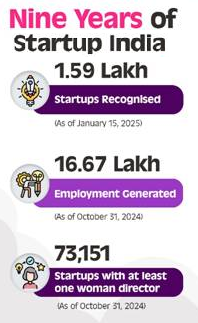Syllabus: GS3/Economy; Employment; Growth & Development
Context
- India has emerged as one of the world’s most dynamic startup ecosystems, becoming a global hub for innovation, entrepreneurship, and technological advancement.
- However, to become the world’s leading startup ecosystem, several challenges must be overcome, and opportunities must be harnessed.
Current Status of India’s Startups
- Growth and Innovation: India, with over 1.59 lakh startups recognized by DPIIT as of January 15, 2025, has firmly established itself as the third-largest startup ecosystem globally, after the U.S. and China. Over 120 startups have crossed the billion-dollar valuation mark.

- Investment Landscape: India’s startups attracted $25 billion in venture capital funding in 2022, making it a preferred destination for global investors. Despite a slowdown in 2023 due to global economic uncertainty, sectors like SaaS (Software as a Service) and climate tech continue to receive significant funding.
- Government Support: Government initiatives like Startup India, Digital India, and Atmanirbhar Bharat have created a supportive framework for entrepreneurs. Key measures include tax exemptions, faster patent processing, and easier regulatory compliance. The 2023 introduction of a ₹10,000 crore Fund of Funds for Startups (FFS) and the Bharat Startup Knowledge Access Registry (BHASKAR) aim to enhance access to capital and collaboration.
- Regional Highlights:
- Expansion: Nearly 50% of startups now originate from Tier II and Tier III cities, with emerging hubs like Indore, Jaipur, and Ahmedabad.
- Tamil Nadu: With a $28 billion ecosystem growing at 23%, Chennai alone hosts about 5,000 startups, significantly contributing to job creation.
- Kerala: The state’s $1.7 billion startup ecosystem is growing at a compound annual rate of 254%, showcasing its ability to hire tech talent cost-effectively.
Challenges Faced by Indian Startups
- Funding Crunch: The global economic slowdown and rising interest rates have tightened venture capital inflows, leading to layoffs and operational cutbacks.
- Regulatory and Compliance Issues: Despite government support, startups face complex tax structures, compliance requirements, and regulatory uncertainties, including recent data protection laws and ESOP taxation policies.
- Scaling Challenges: Operational inefficiencies, lack of market adaptability, and inadequate infrastructure hinder scaling efforts for many startups.
- High Failure Rate: Over 90% of Indian startups fail within five years due to factors like poor product-market fit, inadequate financial planning, and an inability to adapt to consumer demands.
- Talent Acquisition and Retention: Competition for skilled talent, particularly in AI, machine learning, and cybersecurity, along with economic uncertainties, complicates retention efforts.
Suggested Measures
Strengthening Policy Frameworks:
- Simplifying Regulations: Streamline startup registration, funding approvals, and cross-border operations.
- IP Protection: Strengthen intellectual property frameworks to encourage R&D investments.
- Sector-Specific Support: Focus on key sectors like AI, deep tech, healthcare, and green technology through targeted policies.
Enhancing Access to Funding:
- Boost Domestic Investments: Encourage Indian investors, including pension and sovereign wealth funds, to support startups.
- Strengthen Public-Private Partnerships: Create large-scale funds focused on emerging ventures.
- Decentralized Funding: Promote angel networks and micro-investors in Tier II and III cities.
Building World-Class Infrastructure:
- Innovation Hubs: Establish tech parks and incubation centers with state-of-the-art facilities and mentorship.
- Digital Connectivity: Ensure high-speed internet access in rural and semi-urban areas.
- Logistics and Supply Chains: Develop efficient infrastructure to support scaling operations.
Nurturing a Skilled Workforce:
- STEM Education: Encourage technical and entrepreneurial education.
- Upskilling Programs: Collaborate with industry leaders for training in high-demand skills.
- Diversity and Inclusion: Enhance opportunities for women and marginalized communities in tech and entrepreneurship.
Fostering a Culture of Innovation:
- Strengthen R&D: Allocate more resources to university and private-sector research.
- Encourage Risk-Taking: Reduce societal stigmas around entrepreneurial failure.
- Leverage Domestic Challenges: Use issues like climate change and urbanization as innovation opportunities.
Global Collaboration and Market Expansion:
- Global Partnerships: Collaborate with international accelerators and governments.
- Ease Cross-Border Trade: Simplify export procedures.
- Diaspora Networks: Engage Indian entrepreneurs abroad to mentor and invest in domestic startups.
Promoting Sustainability:
- Green Tech Innovation: Foster renewable energy and circular economy startups.
- Eco-Friendly Policies: Incentivize ventures aligned with sustainability goals.
- Promoting Inclusivity and Diversity: Support initiatives like the Women Entrepreneurship Platform (WEP) by NITI Aayog and focus on agritech, edtech, and health-tech startups in rural areas.
- Building a Resilient Digital Economy: Startups must leverage India’s digital infrastructure frameworks like UPI and Aadhaar while capitalizing on emerging technologies such as 5G and AI. Cybersecurity and data protection are pivotal for gaining investor trust.
Conclusion and Way Forward
- India stands at a critical juncture, poised to lead the global startup revolution. Addressing challenges related to funding, skill development, innovation, and inclusivity is essential to strengthening the ecosystem.
- Collaboration between policymakers, investors, academia, and entrepreneurs will unlock India’s potential to transform into the world’s most vibrant startup ecosystem, creating jobs, fostering innovation, and driving economic growth.
| Daily Mains Practice Question [Q] Critically analyze the current state of India’s startup ecosystem and propose a multi-pronged strategy, incorporating government policies and reforms to propel India to the forefront of global innovation and entrepreneurship. |
Previous article
Recalibrating PM-KUSUM Scheme